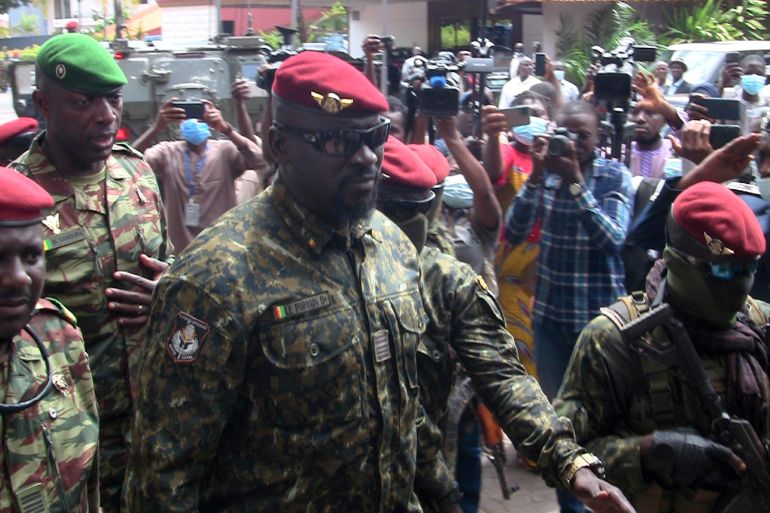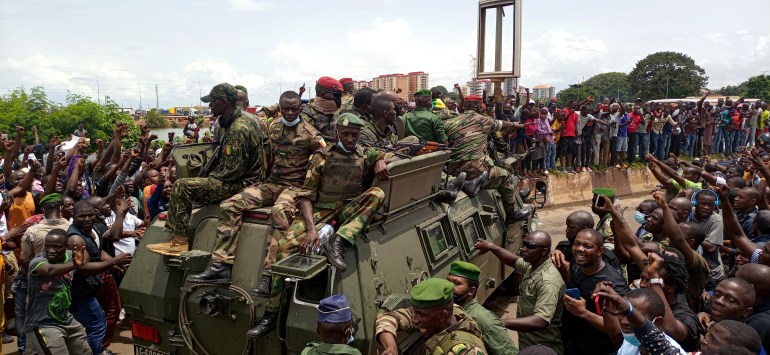Uncertainty in Guinea after military coup removes Alpha Conde
The coup leaders have promised a government of national unity to lead transition to civilian rule, but questions remain about what is next.

Guinea’s leader Alpha Conde used to tell journalists that he was the only one who could lead the country. He would also say the military would not overthrow him.
On Sunday, he was proved wrong.
Keep reading
list of 3 itemsAlpha Conde: The democrat who ‘failed to live up to his promises’
Guinea coup leader bars foreign travel for government officials
An elite Special Forces unit stormed the presidential palace in the capital, Conakry, detaining the 83-year-old president. Hours later, coup leader Colonel Mamady Doumbouya appeared on state broadcaster Radio Television Guineenne, draped in the Guinean flag, introducing himself to surprised Guineans as the country’s new leader.
The putsch in Guinea threw the country into a state of uncertainty, caused the West African economic bloc to threaten sanctions and saw the price of aluminium reach its highest level in more than a decade. Guinea is the world’s biggest producer of bauxite, a mineral used to make aluminium.
Regional leaders immediately condemned the power grab, urging the coup leaders to restore constitutional order and release Conde.
In Conakry, the new military rulers were quick to try and reassure political and economic actors of their good intentions.
A government of national unity would be set up to lead the transition to civilian rule, Doumbouya told members of the overthrown government on Monday.
The new leadership would honour mining contracts, urging companies to continue operations, he said. Land and sea borders that were shut during the takeover reopened in fewer than 24 hours.
This, however, did not convince the Economic Community of the West African States (ECOWAS) regional bloc that went on to suspend Guinea from all its decision-making bodies. Two days later, the African Union followed suit.
Conde in 2010 became Guinea’s first democratically elected leader, his victory seen as putting an end to decades of authoritarian rule by the country’s two first presidents, Sekou Toure and Lansana Conte, who were in office for 26 and 24 years respectively.
Conde was re-elected for a second term in 2015. But he became increasingly disliked when he pushed through a constitutional referendum, backed by Russia, that Conde said allowed him to seek a controversial third term in October 2020 polls, which he won.
Sidy Yansane, a journalist and analyst in Conakry, said Conde brought the downfall on himself.
“Conde was very unpopular, even though people still voted for him. With the third mandate, Conde went too far,” he said by phone.
Questions loom
In his address to the nation on Sunday, Doumbouya said Conde’s removal was necessary and went on to blame his leadership for Guinea’s poverty, corruption, misrule and a lack of development. Doumbouya said a reform of the country’s ruling system and institutions was desperately needed.
“If you see the condition of our roads, of our hospitals, you realise that it is time for us to wake up,” Doumbouya said. What he did not say was when a transitional government could be put in place.
“Right now, people are just happy to see Conde gone,” Yansane said. “But pretty soon, they will need to see some actions from the junta; signs things are about to change, including a timetable for a transition.”

So far, Sunday’s coup has been met with minimal resistance. Cheering crowds greeted the putschists as they drove through Conakry earlier this week.
Sally Bilaly Sow, a 29-year-old blogger and activist, said the coup could be an opportunity to reform and restructure state institutions.
“The important thing now is to not rush. To give an interim leadership enough time for reforms and prepare fresh elections,” Sow said by phone from Conakry.
Cellou Dalein Diallo, the only challenger to Conde in 2020 polls boycotted by the opposition, said he was open to participate but would not set an end date for a transition and a return to civilian rule.
The coup in Guinea is the fourth military takeover in West Africa this year following two coups in neighbouring Mali – the second one as recently as May this year – and a questionable succession in Chad raising concerns of a democratic backslide in the region.
In Mali, the military-led interim government is falling behind an 18-month schedule for general elections that should return the country to civilian rule.
In Chad, President Mahamat Deby, who succeeded his father Idriss Deby in April, seems in no rush to hand power to a civilian government.
An ECOWAS delegation that visited Conakry on Friday said its first meetings with the coup leaders had been “positive”.
The delegation also met Conde, ECOWAS Commission President Jean-Claude Kassi Brou said, referring to the overthrown leader as the “former president” indicating the regional bloc would not call for him to be reinstated.